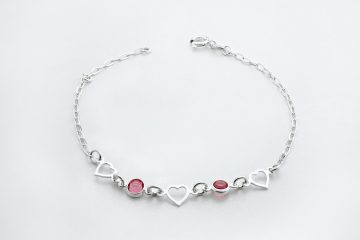Living with rheumatoid arthritis (RA) can be challenging, as it poses various health risks and uncertainties. Managing this chronic autoimmune disease requires careful attention and preparedness, especially during emergencies. One way to ensure your safety and well-being is by wearing a medical alert bracelet specifically designed for individuals with RA. In this article, we will explore the benefits and considerations of using a medical alert bracelet for rheumatoid arthritis, helping you make an informed decision about whether it is right for you.
Understanding Rheumatoid Arthritis and Its Implications
Before delving into the topic of medical alert bracelets, it’s crucial to have a basic understanding of rheumatoid arthritis and its implications. RA is an autoimmune disease characterized by chronic inflammation of the joints, leading to pain, stiffness, and swelling. It can affect people of all ages and genders, although it is more prevalent in women.
Living with RA means facing the possibility of sudden flare-ups, joint damage, and the need for long-term management. While medications and lifestyle changes can help control the symptoms, unforeseen emergencies can arise, necessitating immediate medical attention. This is where a medical alert bracelet can play a vital role in ensuring your safety.
The Role of a Medical Alert Bracelet
1. Instant Identification:
A medical alert bracelet serves as a visual identifier, instantly informing medical professionals and others about your condition. It typically consists of a bracelet or necklace adorned with a distinctive emblem or tag that provides essential information about your health.
2. Emergency Assistance:
In case of an emergency, medical personnel can quickly identify your condition and provide appropriate care without delay. For individuals with RA, this can be crucial, as certain treatments or medications may need to be adjusted or avoided due to potential interactions or contraindications.
3. Allergic Reactions:
RA patients are often prescribed medications that can cause allergic reactions. Wearing a medical alert bracelet alerts healthcare providers about any known allergies, ensuring they can make informed decisions when administering treatment.
4. Joint Protection:
RA can cause joint deformities, making it important to protect them from additional stress or injury. By wearing a medical alert bracelet, caregivers and medical professionals can be aware of your condition, ensuring they handle your joints with care during procedures or treatment.
5. Communication Barrier:
During an emergency, you may be unable to communicate effectively due to pain, confusion, or other factors. A medical alert bracelet can provide critical information when you are unable to do so, helping others understand your condition and medical needs.
Considerations Before Getting a Medical Alert Bracelet
While medical alert bracelets can provide significant benefits, it’s important to consider certain factors before deciding to get one for your rheumatoid arthritis. Here are some key considerations to keep in mind:
1. Talk to Your Healthcare Provider
Before purchasing a medical alert bracelet, it is essential to consult with your healthcare provider or rheumatologist. They can guide you on whether it is necessary for your specific condition and provide any additional recommendations. They may also advise on the specific information that should be included on the bracelet, such as medications, allergies, or emergency contacts.
2. Personal Comfort and Style
Since you will be wearing the bracelet regularly, it’s crucial to choose one that is comfortable and suits your personal style. Medical alert bracelets come in various materials, including metal, silicone, and fabric. Consider the one that feels most comfortable on your skin and blends well with your everyday attire.
3. Engraving and Information
Carefully consider what information should be engraved on your medical alert bracelet. It is important to include your rheumatoid arthritis diagnosis, any allergies, medications, and emergency contact details. However, be mindful of privacy concerns and avoid including unnecessary personal information.
4. Regular Updates
As your condition and medication regimen may change over time, it is important to keep your medical alert bracelet information up to date. Ensure that any changes in your health status or medication are reflected on the bracelet to provide accurate information in case of an emergency.
5. Additional Safety Measures
While a medical alert bracelet can significantly enhance your safety, it is not the only precautionary measure you should take. Ensure you have a comprehensive emergency plan in place, including informing your loved ones about your condition, carrying a list of medications, and having important medical documents easily accessible.
In Conclusion
While wearing a medical alert bracelet may not be a necessity for every individual with rheumatoid arthritis, it can provide peace of mind and potentially life-saving assistance during emergencies. By instantly identifying your condition and medical needs, a medical alert bracelet ensures that you receive appropriate care without delay. However, it is important to carefully consider the benefits and considerations outlined in this article and consult with your healthcare provider before making a decision.
FAQs (Frequently Asked Questions)
1. Can a medical alert bracelet help during a rheumatoid arthritis flare-up?
Yes, a medical alert bracelet can be helpful during a rheumatoid arthritis flare-up by providing crucial information about your condition to medical professionals. They can adjust their treatment approach accordingly, ensuring you receive the appropriate care to alleviate your symptoms.
2. Are medical alert bracelets only for individuals with severe rheumatoid arthritis?
No, medical alert bracelets can be beneficial for individuals with all levels of rheumatoid arthritis. Regardless of the severity of your condition, a medical alert bracelet can provide essential information to healthcare providers during emergencies.
3. Can I wear a medical alert bracelet along with other accessories?
Yes, you can wear a medical alert bracelet alongside other accessories, such as watches or bracelets. Ensure that the medical alert bracelet is easily visible and not obstructed by other items.
4. How often should I update the information on my medical alert bracelet?
You should update the information on your medical alert bracelet whenever there are significant changes in your condition or medication regimen. It is recommended to review the information at least once a year or as advised by your healthcare provider.
5. Can I get a medical alert bracelet for my child with juvenile rheumatoid arthritis?
Yes, medical alert bracelets are available for individuals of all ages, including children with juvenile rheumatoid arthritis. It is important to ensure the bracelet is comfortable and appropriate for your child’s age and preferences.



